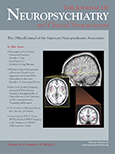Chronic Manic Episode Associated With Hypothyroidism due to Hashimoto’s Disease: A Case Report
To the Editor: Hashimoto’s thyroiditis, an autoimmune disease, is a common cause of primary hypothyroidism. Although hypothyroidism is known to be associated with depression, the occurrence of manic symptoms is rarer. Few available case reports have described acute mania in hypothyroid patients,1 whereas chronic mania (defined as lasting for 2 years or more without remission)2 has not been previously reported.
Case Report
“Mr. Y,” a 64-year-old married man, presented with an episodic illness of 19 years in duration, with a current episode for the last 8 years. The patient had three prior untreated manic episodes, each lasting 4–5 months, at the ages of 43, 45, and 48 years. The patient was asymptomatic between episodes.
The onset of the current episode occurred at 58 years of age (after 10 years of remission). Family members noticed increased socialization, including visiting the neighbors uninvited and approaching strangers for a discussion pertaining to religious/life matters. He had become more talkative, overactive, and more energetic than his usual self. Over the next 2–3 years, he volunteered to build several new temples in the neighborhood using his savings and made big, expansive plans to restore national buildings. He appeared mostly cheerful, with occasional irritable/aggressive behavior. He did not take on much of the household responsibilities. His need for sleep had decreased.
A family history revealed bipolar disorder in two first-degree relatives. No abnormality was detected during the physical examination. His mental state examination revealed distractibility, increased psychomotor activity, ideas of grandiosity, impaired concentration, impaired personal judgment, and poor insight. A provisional ICD-10 diagnosis of bipolar disorder was made.
Blood investigations revealed a hypothyroid state [thyroid-stimulating hormone (TSH), 17.0 μIU/mL; T3, 30.0 ng/dL, T4, 4.5 μg/mL], and at a later stage, anti–thyroid peroxidase antibody was positive. The patient was started on divalproate 1000 mg/day, quetiapine (titrated to 400 mg/day), and thyroxine (increased to 150 μg/day), with periodic thyroid tests. A gradual improvement was observed, and the patient achieved euthymia after 4 months. Quetiapine was tapered after several months, and the patient was advised to continue with divalproate 1 g/day and thyroxine 150 μg/day. He maintained well in follow-up for more than 2 years.
Discussion
Although an organic mood disorder was considered, it appears unlikely because the onset of the illness was two decades before presentation. It is likely that hypothyroidism with onset in more recent years may have influenced the course of the current episode, making it unusually prolonged and unremitting. In a previous study, it was observed that patients with abnormal thyroid indices (suggestive of hypothyroidism) had a relatively longer duration of illness in lithium-free manic patients.3
The proposed hypothesis for occurrence of mania in hyperthyroidism (which is the more frequent association) is an increased β-adrenergic receptor sensitivity, leading to increased catecholamine action,4 but the mechanism for mania in the setting of hypothyroidism is not understood. One particular study points to high rates of thyroid autoimmunity in bipolar disorder patients compared with healthy control subjects.5
There is a need to evaluate for thyroid disease in all manic patients with a persistent or atypical course. More research is needed to understand the link between thyroid abnormalities and the chronicity of mania.
1 : Acute mania in the setting of severe hypothyroidism. Psychosomatics 2005; 46:259–261Crossref, Medline, Google Scholar
2 : Manic-Depressive Illness. New York, Oxford University Press, 1990Google Scholar
3 : Evaluation of thyroid function in lithium-naive bipolar patients. Eur Psychiatry 1999; 14:341–345Crossref, Medline, Google Scholar
4 : A hypothesis of thyroid-catecholaminereceptor interaction. Arch Gen Psychiatry 1981; 38:106–113Crossref, Medline, Google Scholar
5 : High rate of autoimmune thyroiditis in bipolar disorder: lack of association with lithium exposure. Biol Psychiatry 2002; 51:305–311Crossref, Medline, Google Scholar



